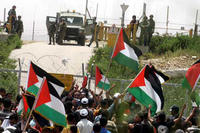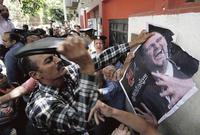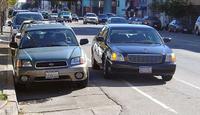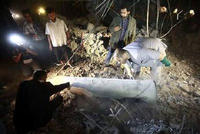-
Spiraling violence and Assad's desperate tactics

The conflict in Syria between anti-government protesters and the Basher al Assad regime escalates; two signs of escalation: the Saudi and Jordanian covert support of the anti-Assad forces is beginning to tell, and the regime, growing ever more desperate, is targeting children for torture and death and busing hundreds of Palestinians living in Syria to the border with Israel as a diversion; the Palestinian issue is a potent issue, and exploiting it for diversion may appear as clever ploy by a desperate ruler; it is not likely to work, though: If Israel manages to keep the level of violence low, and if it finds better — non-lethal — means to deal with repeated attempts of Palestinians from Syria to breach the border, then whatever happens along the border would just not be powerful enough — in terms of TV footage, drama, and the number of people killed or wounded — to offset to growing brutality inside Syria
-
-
Skeptical Israeli, weakening Assad, predictable UN
Meir Dagan, who retired in December as head of Israel’s Mossad, is not a sandals-and-beads-wearing lefty; yet, he has emerged as the most persistent critic of the current Israeli leadership’s approach to possible military action against Iran’s nuclear facilities; he says that Israel may be able to destroy Iran’s nuclear facilities, but Israel will not be able to prevent a massive and sustained Iranian retaliation: Israel’s population and economic centers will be showered by thousands of missiles and rockets from Iran and its two local agents, Hezbollah and Hamas; if necessary, Dagan says, Israel will have to absorb this punishment — and it will be able, painfully, to do so; the emphasis, though, is on “if necessary”; more and more observers have concluded that Assad’s day in power are numbered; Assad is in a no-win situation: if he makes more concessions to the anti-government demonstrators, he will appear weak and alienate the hard-liners in his circle; if he continues to kill dozens of Syrian civilians a week, his already-eroded legitimacy as the ruler of Syria will weakened even more; thirty-four civilians were killed today by live rounds in the city of Hama; in September, the UN will hold a 10-year commemoration of what is known as Durban I — the World Conference Against Racism (WCAR) in Durban, South Africa; the Obama administration has decided not to participate in the September event because, Joseph E. Macmanus, acting U.S. assistant secretary of state for legislative affairs, said, the Durban process “included ugly displays of intolerance and anti-Semitism”; the United States withdrew from Durban I ten years ago after Colin Powell, the U.S. secretary of state, harshly criticized the “hateful language” dominating the conference and the documents it produced, language that “singles out only one country in the world, Israel, for censure and abuse”
-
-
U.S., Canada harmonize perimeter security approach
No other two countries in the world have a larger volume of trade between them as do the United States and Canada; in the first eleven month of 2010, for example, that trade between the two countries reached $480 billion; that trade — and, especially, significant growth of that volume of trade — have been hampered by ever tighter security arrangements the United States has been implementing along the U.S.-Canada border since the 9/11 terrorist attacks; the main reason the United States has insisted on beefing up border security is that Canadian immigration and customs laws have been judged to be not up to what the United States would regard as acceptable standards; the U.S. message to Canada was thus straightforward: the higher the security walls around Canada, the lower the security wall between Canada and the United States; Canada’s prime minister Stephen Harper agrees, and Canada is now working with the United States on harmonizing perimeter security arrangements; some Canadians are unhappy, saying the deal will result in sacrificing cherished Canadian values and practices
-
-
Potential China Taiwan deal on rare earth metals
Taiwan could soon start receiving shipments of rare earth minerals from China in a move that could help bolster its technology and chemical companies; last week, officials from China and Taiwan met to discuss a potential deal that would ease some of China’s export quotas and tariffs on rare earth shipments; the deal with Taiwan would likely do little to affect global prices or trade as Taiwanese companies purchase far less than their Japanese, European, and American counterparts; but some analysts believe the deal would still benefit Taiwanese companies by giving them a competitive advantage
-
-
Napolitano visits Mumbai in advance of U.S.-India strategic dialogue
On Wednesday, DHS Secretary Janet Napolitano visited Mumbai, India where ten gunmen killed more than 160 people in a November 2008 terrorist attack; Napolitano met with local counterterrorism and law enforcement officials to discuss their policing and counterterrorism strategies; Napolitano’s visit comes as part of a four day visit to India which will culminate in a formal dialogue with India’s top security chief Home Minister P. Chidambaram; the meeting will be the first formal dialogue between the two countries; topics for discussion will include counter-terrorism, but also financial fraud, counterfeiting, and currency smuggling; the high level strategic dialogue is designed to bolster ties between the United States and India by increasing communication and information-sharing practices on terrorism and national security issues; as Napolitano meets with her Indian counterpart, Tahawwur Rana is on trial in Chicago for assisting David Coleman Headley provide intelligence to Lashkar-e-Taiba terrorist organization in their attack on Mumbai; India has been on a heightened state of alert since bin Laden’s death and has increased security along its borders
-
-
Palestinians catch Israel, Syria, and Hezbollah by surprise

On 15 May 1948 the State of Israel was born; for Israel this is Independence Day, but for Palestinians the day is naqba (catastrophe in Arabic); this year the naqba commemoration included something new, and perhaps more menacing: hundreds of Palestinians gathered at two spots along the Israeli border, then tried to force their way into Israel; fourteen Palestinians were killed and a few dozens injured in ensuing clashes with the Israeli military; it is easy to accuse the Syrian leadership of allowing the demonstrators to cross into Israel in the hope of inviting an Israeli military reaction which would divert attention from the daily killing of civilians by the Syrian military; it is also plausible to argue that the Iranians, opposing any peace negotiations between the Arab states and Israel, welcomed the clashes along the Israel-Lebanon border; these arguments are plausible, but problematic; the record shows that Syria and Hezbollah have always insisted on complete monopoly over the use of force along their respective borders with Israel
-
-
Remote bomb detection sensors
European scientists are embarking on a project to develop a network of state-of-the-art sensors capable of detecting hidden explosives; the sensors will work by detecting the chemical traces of explosive vapors in the air in order to provide early warning to security services and protect vulnerable urban populations from the threat of Improvised Explosive Devices (IEDs), often used by terrorist organizations
-
-
Crackdown spreads across Syria

The Syrian security forces have expanded their campaign against anti-government protesters; the number of civilian killed stands at 780, and the experts told the New York Times that the regimes has so far arrested more than 10,000 people suspected of harboring anti-regime sentiments; Sunni neighborhoods in the city of Homs, Syria’s third largest city, have been shelled; the regime continues the tactics of surrounding cities and towns with army unites, and cutting these cities off from power, communication, and the Internet; the Obama administration is edging closer to calling for an end to the long rule of the Assad family; one official said the first step would be to say for the first time that Assad has forfeited his legitimacy to rule, a major policy shift; meanwhile, international pressure has caused Syria to drop its plans to run for a seat on the UN Human Rights Council; Kuwait, which was expected to stand in 2013, will take its place
-
-
Denying foreign aid to countries with outstanding NYC parking tickets

New York City is home to 289 foreign missions and consulates, and their foreign diplomats have incurred more than $17.2 million in parking fines; these fines were issued due to safety violations, including the blocking of fire hydrants, which put the safety of NYC residents at risk; there is already a law on the books stating that 110 percent of the total unpaid parking fines owed to NYC and the District of Columbia are to be withheld from foreign aid and obligations to the countries at fault, but so far this law has not been enforced; three New York House representatives want to change that, telling other countries: pay your NYC parking tickets or forget about foreign aid
-
-
Pakistan: duplicitous and impotent
While most of the attention in the past week was paid to who in the Pakistani government was protecting bin Laden, there is another question that the raid by the SEALs exposed: the impotence of the Pakistani military; since 9/11, the United States has given Pakistan more than $10 billion in military aid; the United States wanted these funds to go to counter-terrorism efforts; the Pakistanis used this money toward conventional equipment geared toward a war with India; the raid exposed the fact that the Pakistanis have not done a very good job at that
-
-
Enough already: UNHRC leader questions killing of OBL
The ultimate oxymoron of our time? Easy: “UN High Commissioner for Human Rights”; the UN does not promote human rights or advance human rights because it cannot do so; it cannot do so because the human rights record of most of its members is nothing short of appalling; what do we want these UN members to do: volunteer to vote for and promote the very values they reject and suppress at home? Now the leader of the UN human rights body raises questions about the U.S. killing of OBL; the George W. Bush administration withdrew the United States from the UNHRC; two years ago the Obama administration re-joined that body in the hope of reforming it; it is time — high time — for the administration to admit it made a mistake and withdraw U.S. membership
-
-
Syria intensifies its repression campaign
The government of Basher al-Assad has intensified its campaign to suppress the anti-government protests that have challenged the regime. The number of civilians killed by the security forces has risen to 560, with the number of people injured by the live rounds the military is using against the protesters reaching thousands; over the weekend, the government has also launched a campaign of mass arrests
-
-
Coalition escalates pressure on Gaddafi

The continuing ineffectiveness of the anti-Gaddafi rebels, and the flexibility and adaptability that the pro-Gaddafi forces have shown, have led the coalition to ratchet up the military pressure on Gaddafi: Britain, France, and Italy have decided to inject military advisers into rebel-held eastern Libya, and the United States began continuous patrols of armed drones over Libya; the latest, and probably most important, step was the decision to launch air strikes targeting command, control, communications, and intelligence (C3I) hubs and facilities; in one such attack over the weekend, one of Gaddafi’s sons — who was at the compound at the time — was killed, along with his three children; some have speculated that the coalition is now targeting Gaddafi and his family, but analysts say that legal questions aside, such targeting will have no effect on the military realities on the ground while making it politically and diplomatically more complicated to carry on the campaign
-
-
Palestinian missteps; Assad may need a mid-course correction
Over the past four years, since Salam Fayyad became prime minister of the Palestinian Authority on 15 June 2007, the Palestinians have made steady progress toward realizing their dream of self-determination; Fayyad openly said that his plan was to emulate the way the Zionist movement, from the turn of the last century until the declaration of Israel’s independence in 1948, worked diligently to build the economic, social, political, and educational infrastructure of the state so that when the state did come it would have solid foundations; he has been successful, adding to his success the fact that the level of mutual confidence and cooperation between the Palestinian and Israeli security services has never been higher; in September, the UN will recognize Palestine as a state and accept it to membership; all these achievements may be derailed by the dramatic announcement on Wednesday of a Fatah-Hamas reconciliation; further north, in Syria, the Assad regime is using ever-increasing violence to suppress the anti-government protests; the question is what will happen first: the end of the protests, or the refusal by the military to continue to kill 100-200 unarmed civilians a week
-
-
Syria is set to join the UN Human Rights Council

The Syrian regime has intensified its campaign against anti-government protesters; some 400 protesters have been killed so far and many hundreds have been wounded by live rounds the Syrian police and military use against the protesters; dozens of people suspected of harboring anti-regime sentiments have disappeared — apparently abducted by secret service agents and sent to remote prison camps; the military has surrounded several cities in a move reminiscent of Bashar al-Assad’s father, Hafez, who, in February 1982, ordered the destruction of the city of Hama in a scorched-earth policy against the Muslim Brotherhood; the grim news from Syria notwithstanding, the UN is scheduled to vote on 20 May on Syria’s membership in the UN Human Rights Council; the United States will vote against Syria’s membership, but the majority of the members of the UN will support it
-
- All
- Regional
- Water
- Biometrics
- Borders/Immig
- Business
- Cybersecurity
- Detection
- Disasters
- Government
- Infrastructure
- International
- Public health
- Public Safety
- Communication interoperabillity
- Emergency services
- Emergency medical services
- Fire
- First response
- IEDs
- Law Enforcement
- Law Enforcement Technology
- Military technology
- Nonlethal weapons
- Nuclear weapons
- Personal protection equipment
- Police
- Notification /alert systems
- Situational awareness
- Weapons systems
- Sci-Tech
- Sector Reports
- Surveillance
- Transportation
Advertising & Marketing: advertise@newswirepubs.com
Editorial: editor@newswirepubs.com
General: info@newswirepubs.com
2010-2011 © News Wire Publications, LLC News Wire Publications, LLC
220 Old Country Road | Suite 200 | Mineola | New York | 11501
Permissions and Policies
Editorial: editor@newswirepubs.com
General: info@newswirepubs.com
2010-2011 © News Wire Publications, LLC News Wire Publications, LLC
220 Old Country Road | Suite 200 | Mineola | New York | 11501
Permissions and Policies
